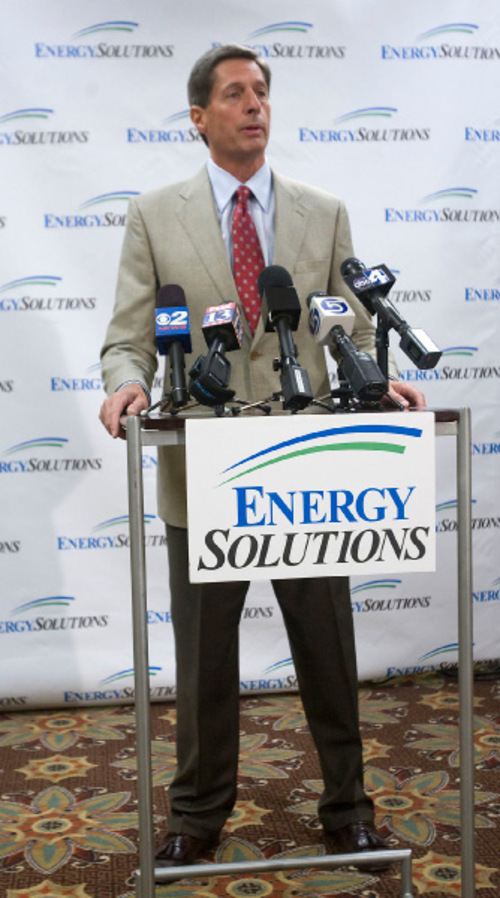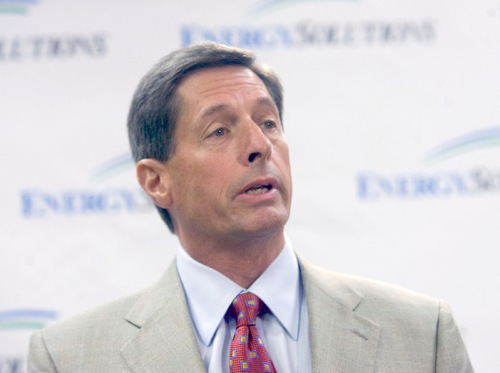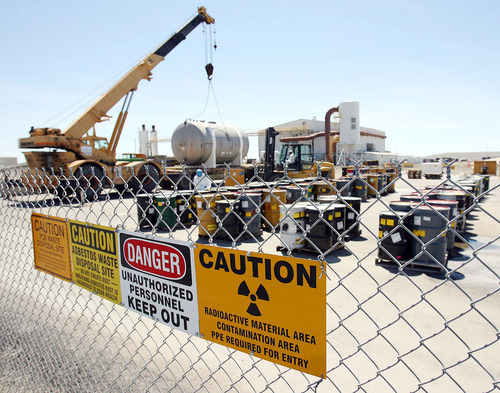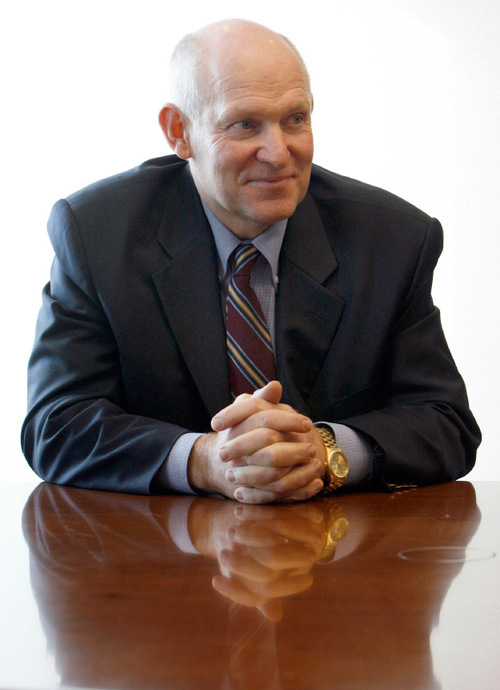This is an archived article that was published on sltrib.com in 2010, and information in the article may be outdated. It is provided only for personal research purposes and may not be reprinted.
August was a busy month in the courts for EnergySolutions Inc., the Salt Lake City-based nuclear waste company.
On Aug. 4, a class-action shareholder suit updated allegations that company managers exaggerated key business prospects to pump up the stock price just before investor-owners cashed out and the stock plummeted.
Then on Aug. 26, Sanjay Israni of New Jersey filed a special lawsuit, called a "shareholder derivative action," claiming that officers and directors no longer were in a position to protect the company and its shareholders from that mismanagement. After officers allegedly "pimped" the stock and pocketed more than $1.2 billion, some current shareholders now want the money returned to the company.
Also Aug. 26, a 3rd District judge in Salt Lake City rejected EnergySolutions' request to throw out a 4-year-old antitrust suit filed by the waste company's onetime president, Charles Judd. In that case, allegations such as a shortage of radioactive waste-disposal space and underpayment of taxes — both issues of community importance — are on the line.
At the heart of all three suits is the charge that EnergySolutions essentially slapped lipstick on a pig, helping company leaders profit while harming others.
"Contrary to [EnergySolutions'] portrayal of the company's business and prospects, facts that existed at the time of the statements rendered many of [the company's] statements untrue and misleading," says the class-action suit making its way through the U.S. District Court in the Southern District of New York. The original suit was filed last fall by the employee retirement fund of the City of Roseville, Mich., and was later consolidated with actions brought by the Building Trades United Pension Trust Fund and the New England Carpenters Guaranteed Annuity and Pension Fund.
In the face of the legal challenges, EnergySolutions is prepared to fight the allegations, said Dale Didion, executive vice president for government relations and communications. "None of the claims have any merit. And we will defend [the company against] the lawsuits vigorously," he said, without elaboration, in an e-mail response.
EnergySolutions stock closed below $5 a share Friday, about one-fifth the price the stock fetched in its November 2007 initial public offering and one-quarter the price it drew in a secondary offering the next summer.
With more than 5,000 employees and operations on three continents, EnergySolutions has grown from a privately owned and operated disposal site for low-level radioactive and hazardous waste in Tooele County to a full-service nuclear waste services corporation that did $1.6 billion in business around the world last year. The company's founder and former CEO, Steve Creamer, and successor Val J. Christensen are named as defendants in both suits, along with others.
Plaintiffs in the shareholder lawsuits accuse the company's leaders of touting business opportunities they knew would never materialize or suspected to be unlikely. The company promoted its life-of-plant contracts, even though the contracts were structured in a way that actually drove away business, and managers told company leaders so, the suits allege.
In addition, both shareholder suits claim, managers knew that a nuclear site decommissioning and decontaminating service (D&D) leaders were touting actually offered very little near-term revenue for EnergySolutions, even though company officials repeatedly said sales were just ahead. Company officials said by taking over plant licenses for 13 reactor sites and tapping into their federally mandated D&D funds, EnergySolutions could expect up to $3.1 billion in business in coming years, the suit alleges.
Trouble was, say the lawsuits, the company knew that just one D&D job was on the near-term horizon, that some companies had already rejected the EnergySolutions proposal, that the company was not able to handle more than one of these contracts at a time and, that even if it landed several jobs, the D&D funds were insufficient to do the work.
The lawsuits also say the company wasn't straight with investors about its important large-components business. EnergySolutions, they said, did not disclose how unlikely it would be for the U.S. Nuclear Regulatory Commission to make a crucial change in a long-standing policy, a policy that did not allow access to shutdown funds until a reactor site was being closed for good.
Executives repeatedly told investors they were optimistic the commission would support using trust funds for the large components, the suits claim, even though they privately discussed the rule change as being improbable.
In fact, says the retirement-fund suit, one executive bet another that "he would run through the parking lot naked if the NRC approved" EnergySolutions' request to change the policy.
Just weeks after EnergySolutions' secondary offering two years ago, the NRC rejected the company's petition. The company would have to apply to access the funds on a case-by-case basis.
EnergySolutions last week finalized its licensed stewardship contract with the Zion Generating Station, two reactors that were closed in 1998, about two years later than originally proposed. The delay on the $1 billion job allowed the cleanup fund to recover about $175 million from what EnergySolutions described at the time as an economy-induced slump.
The Israni lawsuit, filed in the U.S District Court in Salt Lake City, said members of the board of directors, as well as founder and former CEO Creamer, should be held accountable for the company's alleged misrepresentations. Israni, like the plaintiffs in the consolidated class-action suit, requests a jury trial.
"By their actions alleged herein," says the shareholder suit, "the individual defendants, either directly or through aiding and abetting, abandoned and abdicated their responsibilities and fiduciary duties with regard to prudently managing the assets and business of EnergySolutions in a manner consistent with the operations of a publicly held corporation."
Misrepresentations are also alleged in the antitrust suit brought by Judd, who today is the owner of a disposal firm called Cedar Mountain Environmental and was a president of the radioactive waste disposal company when it was called Envirocare. This suit charges, among other things, that EnergySolutions has over-promised the disposal space in its Tooele County landfill and that the company has failed to pay its proper share of state taxes.
In an odd side note, the waste company's former president, Judd, signed up months ago for one of the disposal site tours the company has touted in its recent marketing campaign.
Judd had ordered his box lunch and was waiting last week for the shuttle to the site about 75 miles from the company's downtown Salt Lake City headquarters, when he was told he would not be able to take the tour.
"It was entirely inappropriate for Charles Judd, a litigant against the company, to circumvent the rules of discovery by attempting to join a tour of the Clive facility," said EnergySolutions' Didion.
Judd was disappointed about not having an opportunity to see the updated Tooele County site firsthand.
"If someone was questioning what they were saying — they don't want that to happen."
About the company
EnergySolutions has grown from a privately owned and operated disposal site for low-level radioactive and hazardous waste in Tooele County to a full-service nuclear waste services corporation.
Employees • more than 5,000
Operations • in three continents
$1.6 billion • in business worldwide









